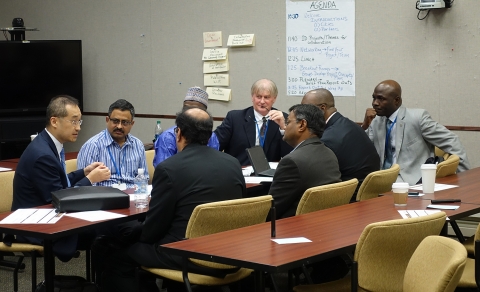Sep262016
Posted at 4:30 PM
Guest blog by Sokwoo Rhee, Associate Director of the Cyber-Physical Systems Program at NIST
Three years ago, the National Institute of Standards and Technology teamed with US Ignite to launch the Global City Teams Challenge (GCTC) to encourage collaborations that use Internet of Things-based solutions to tackle large-scale problems that reduce quality of life. We have seen this effort grow each year as more and more companies and communities seek to participate, and new partners bring new opportunities.
As part of its Smart Cities Week celebrations, today the White House announced the award of our first funds to support the effort, with grants totaling $350,000 for projects in four U.S. communities that address air pollution, provide flood prediction and improve delivery of city services. The Replicable Smart City Technologies grants support projects that will use the Internet of Things, which involves connecting smart devices and systems in fundamentally new ways. The goal is to create technology-based solutions that can be fine-tuned and then implemented by other communities.
All of these projects are notable for their replicability down the road. Once one city finds a solution that works well, it can be repeated in other places, reducing the cost of solving similar problems elsewhere.
Portland, Oregon, will deploy and test low-cost air quality sensors to measure urban air pollution. The project will produce a framework for using these types of sensors for urban air quality applications in monitored networks, and it will share these guidelines to help other cities implement similar sensor networks.
Montgomery County, Maryland, will enhance its Safe Community Alert Network (SCALE) project, which aims to ensure a safer environment for residents by using Wi-Fi enabled sensors to alert first responders to an emergency—a job that previously was accomplished only with phone calls. With the help of advanced sensor technology, elderly residents would no longer need to fear a fall, and families would no longer fall victim to a smoke detector with a dead battery. The county will take the prototype platform into a new stage of development that will allow it to be replicated in other communities.
Bellevue, Washington, will create dashboard-style internet interfaces for sharing data among city departments, and in the future, with the public. The ultimate goal is to enable city staff to leverage real-time data in their daily activities to improve efficiency and effectiveness. Bellevue will use an open, standards-based architecture to improve city-wide interconnectivity of department systems, including police and fire, civic services, transportation, utilities, and information technology.
Newport News, Virginia, will develop computer models to predict urban flood events. The project will create its models using water-level sensors and crowd-sourced data, and it will add a predictive modeling tool to plan emergency responses. This project is a collaboration between the Virginia Institute of Marine Science and eight partner cities in the Hampton Roads region. Some partner cities, such as the City of Norfolk, are working on a broader resilience strategy, so this project will help increase situational awareness of storm events for the entire region.
Until now, GCTC has focused on drawing attention to the challenges and potential of smart city technologies, and helping to create collaborations around the world. These grants will help to ensure that a wider set of communities can take advantage of the creative work GCTC has produced and perhaps someday soon, many more of our cities will be smart.


